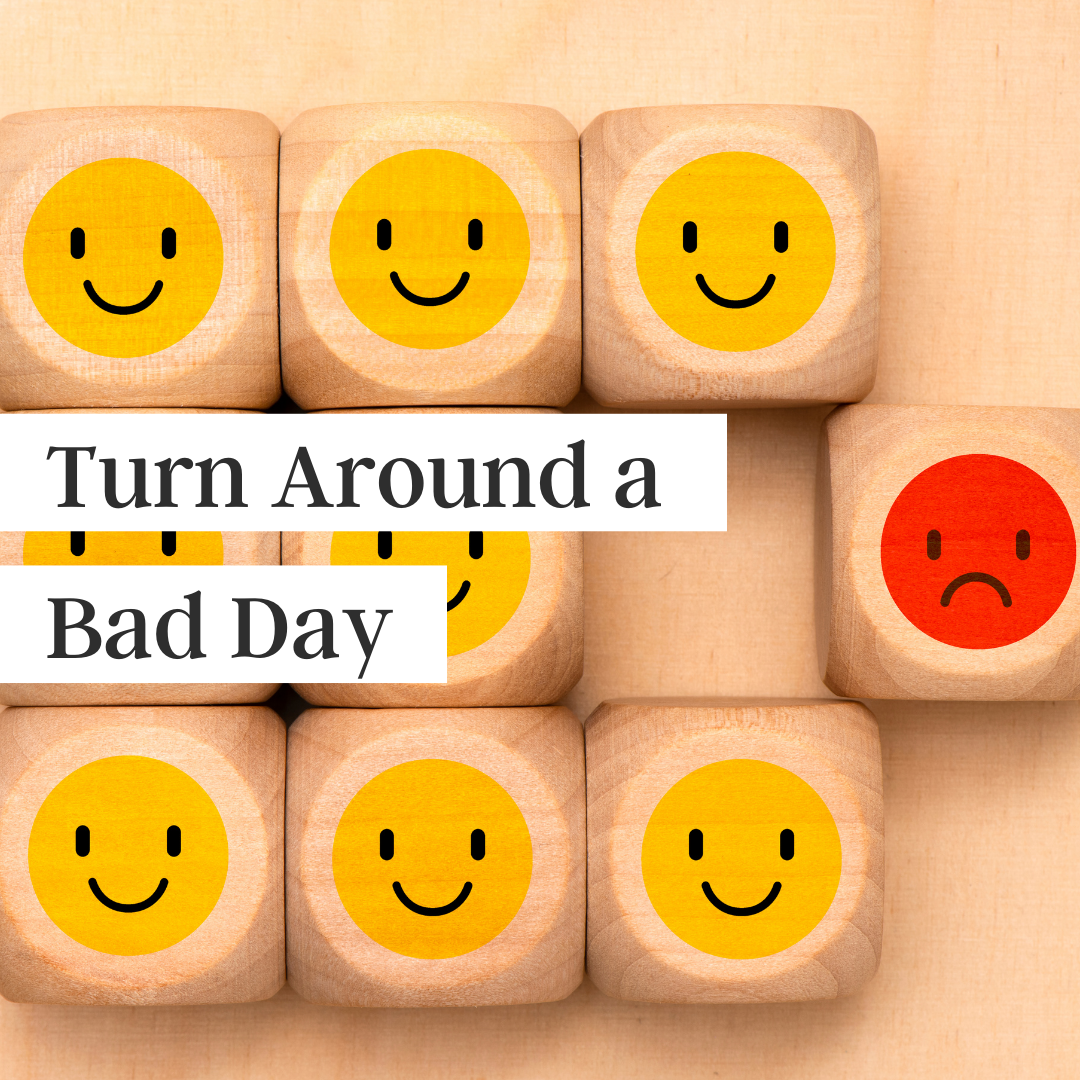When you’re having a bad moment or day (or even a long series of bad days), it can feel like things will never get better. You may intellectually understand that change will eventually come, but that doesn’t lessen the load in the moment.
At those difficult times, it’s tempting to beat yourself up, lash out at others, or simply give up. To avoid these less-than-desirable reactions, it can be helpful to have a few healthy responses at the ready.
Want to know how to turn around a bad day? Here are 10 tools that can help you feel better. Keep them in your back pocket to pull out whenever you need to turn around a negative downward spiral.
*Note: Coaching is not a substitute for professional mental health care or medical care. This advice is not meant to take the place of any form of therapy. If you are feeling especially bad, or are having thoughts of self-harm, please seek help from a licensed therapist right away.
1. Acceptance
When you find yourself down—or angry, frustrated, overwhelmed—it can be really useful to simply be with the feeling. This is about coexisting, not criticizing. Rather than judging it, just observe it. Recognize that you are a person having a thought or feeling, nothing more.
When you feel the urge to judge the thought or feeling as good or bad, lovingly nudge yourself back into the role of unbiased observer.
If you have the energy, you can also get curious about the thought or feeling. When do you first remember feeling or thinking this? What made you feel or think this? What is the thought or feeling wanting you to know? Who benefits from you thinking or feeling this way?
If that line of questioning feels energetically draining or unsafe, then stop and simply return to the goal of presence without judgment.
2. Mindfulness
When it comes to “mindfulness,” meditation gets most of the attention. It’s a wonderful practice, but is also very misunderstood. Too often, we think we can only meditate if we have 10 minutes to an hour to dedicate to sitting in silence.
I think it can actually be far more powerful to sprinkle shorter bits of mindfulness throughout your day. Mindfulness simply means being aware of and fully present in the current moment. It’s about bringing your focus—even if only for a few fleeting seconds—to the present (vs. living in the future or past).
This practice is so powerful because it helps reduce stress and worry, which are results of living in the past or future. Taking even a few seconds to recenter or ground yourself in the present can dramatically improve how you feel.
READ: 3 easy mindfulness exercises you can do in a few minutes or less
3. Movement
Like mindfulness, exercise tends to be something we judge as only being “worthy” if it takes up a decent amount of time. That type of thinking is rooted in patriarchal (capitalistic) notions of productivity, and it can be extremely damaging.
In truth, all movement is beautiful, helpful, and worthy. Moving your body doesn’t have to be tied to any physical or aesthetic goal. It can be strictly for feeling better, and it can look however you want and last as long or as short as you like.
Movement is known to be a powerful tool for “completing the stress cycle” (read “Burnout” by the Nagoski sisters for a well-informed explanation), or releasing the trapped feelings of stress and overwhelm.
4. Crying
In a patriarchy, people learn from a very young age that crying is bad (because it’s a “feminine” or “weak” trait). We are told to “brush it off,” “suck it up,” and not be “too emotional.”
That’s so unfortunate because crying is not only natural, it’s incredibly healing. It’s a release valve for so many feelings, from stress or sadness to grief and frustration. Tears are cathartic; they cleanse the body of stress, metaphorically and literally.
In a world that tells you crying is bad, it takes incredible strength to do it. It’s not weak, it’s a sign of courage. Shedding tears is one of the bravest acts of self-care possible.
5. Laughing
There’s truth to the saying, “laughter is the best medicine.” Science has found that laughing has myriad benefits. It relieves physical tension, decreases stress hormones, increases immune cells, releases feel-good endorphins, and can even help you live longer.
When you’re feeling down, try forcing a laugh. Very often, a forced laugh will eventually turn into a real one. The same goes for smiles.
A few other ways to work a little laugh therapy into your day include watching a funny movie, reading a joke book, searching for silly .gifs or memes, hosting a game night with friends, dancing with a child, playing with your dog, letting loose at karaoke, or attending a laughter yoga class.
6. Sleeping
Getting too little sleep causes stress levels to increase. Feeling stressed can cause sleep deprivation. It can be a pretty awful Catch-22. Plus, being tired depletes us of the energy required to proactively and positively cope with difficult days.
Improving the quantity and quality of your sleep isn’t a short-term solution, but it’s an important piece of the feel-good puzzle.
There are things you can do to improve your relationship with sleep—sticking to a schedule, cutting back on or eliminating caffeine, not napping, getting exercise, meditating. That said, as a recovering insomniac myself, I know it’s not always as simple as it seems. It can be helpful to talk to your physician and seek out therapy if you’re not sleeping enough.
7. Gratitude
When you’re down, it’s easy to get singularly focused on scarcity. You may only think about what you don’t have, what’s missing, what you wish for to change your circumstances.
As always, I am not an advocate for ignoring those feelings, pushing them down, or beating yourself up for having them. In truth, there may be some very real deficiencies that are rightfully causing you anger or frustration.
If you get to a place, however, where you’d like to do some work to shift out of scarcity and into abundance, gratitude work can be a game changer.
A first step is to simply list out everything for which you have to be grateful. This can truly be as simple as looking around you and itemizing all that you have (as an example, I’m in my office and I could easily list more than 100 things in this space).
To go a step further, however, I really recommend thinking about how you can EXPRESS or SHOW gratitude. Write a thank-you note, text a friend some appreciation, send a gift to your mom. Taking action and including others in your gratitude is almost always more powerful than writing down what you have or love.
Please do gratitude work only if it feels good. It doesn’t work if you force it but don’t mean it, and it definitely doesn’t work if someone else is using it as a weapon against you (read more about that here).
8. Forgiveness
“Resentment is like drinking poison and waiting for the other person to die.” I believe the first person to say this was St. Augustine, although it’s been repeated many times in many ways by countless others.
Hopefully you recognize that holding onto anger isn’t healthy. And I mean that literally. Studies have found that forgiveness is associated with lower levels of depression and anxiety, reduced substance abuse, higher self-esteem and greater life satisfaction.
There’s nothing about forgiveness work that is easy, but it is fairly simple. There are two parts: First, making the conscious choice to let go of the hurt, and second, actively stopping the rumination on negative feelings. The second part is more difficult; it takes time and practice.
Withholding forgiveness for others or for yourself, keeps alive all of the anger and hurt. Doing the work to let go can free yourself from the stress and pain. Of course, you cannot forgive before you are ready. Don’t beat yourself up if it’s not yet the right time.
9. Talking
Suffering in silence is lonely, and our most difficult emotions can often multiply when they exist in the dark. Shedding light on them, however, can help them dissipate.
When you feel down, chances are good that you ache to be seen, heard, and loved (even if you can’t yet admit it to yourself). Having your feelings witnessed, validated, and loved can be healing and empowering. Just look at the “Me Too” movement and how powerful it was for so many to hear that they weren’t alone.
If you’re not yet ready to confide in a friend or seek out therapy, witness for yourself by writing out your feelings in a journal. If you feel ready, validate the feelings for yourself by writing next to each one some version of, “it’s normal to feel this way” or “of course you feel this way.” Finally, love yourself by writing or saying aloud, “I love you.”
10. Connection
“It takes a village,” yet modern living has become incredibly isolating. So many of us can go through our days interacting with very few people, and rarely or never having meaningful conversations.
I recently shared a post on TikTok saying that it doesn’t get talked about enough that it’s really hard to make friends as an adult. That post exploded and now has about 80,000 views and more than 1,000 comments. I was blown away, but probably shouldn’t be surprised, to hear how many people feel like they have few or no real friends.
That’s such a problem because connecting with others is such a powerful tool for emotional regulation. Being part of a community is a basic human need, yet many of us aren’t having this important need met. And it only makes our bad days worse.
Find yourself a group of like-minded people who are dedicated to personal growth. They can be your support system when you need to be witnessed, validated, and loved. And you can return the favor to be there when they need the same.
I hope these tips were helpful. I’d love to hear what other things help you when you’re feeling low. Share yours in the comments!


